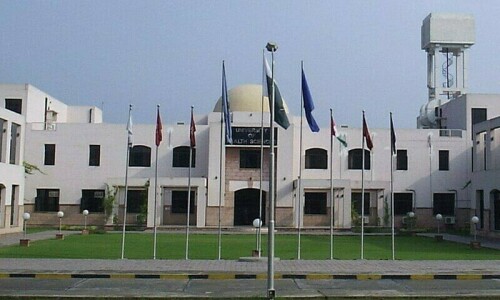LAHORE: Citing the recent ranking of Air Visual’s Air Quality Index that shows Lahore continues to be one of the most polluted city in the world, the World Wide Fund for Nature-Pakistan regrets the government has failed to fully implement the measures necessary to keep the city’s air quality within safe limits.
An AQI ranking between 300-500 or above is classified as ‘hazardous’ and indicates there is a health emergency which is why the WWF-Pakistan is appealing to the citizens to limit their outdoor activities by staying at home where possible and to wear mask to protect themselves.
The air quality continued to deteriorate in Lahore from December 2020 to February 2021, with the AQI dropping to 100-200 on rainy days, which is still considered unhealthy and has serious health consequences.
The elevated level of smog in Lahore, according to the United States Environmental Protection Agency, is caused by electricity production via coal, gas and fossil fuel-based carbon emissions that contributes around 25pc of the total air pollution, eventually becoming smog. Besides, agricultural activities and land use accounts for 24pc, industry 21pc, transportation 14pc, others 10pc and buildings (energy used in buildings for heating, cooling, lighting, etc) 6pc.
Other factors contributing to smog are the use of sub-standard fuel, burning of crop residues and solid waste, and emissions from brick kilns and furnaces.
In an order issued on Oct 15, 2020, by the Punjab relief commissioner, a complete ban was recommended on crop stubble burning, vehicle emissions beyond the admissible limits, industries without emission controls and brick kilns not on zigzag technology by Dec 31, 2020.
The WWF regrets that except for the conversion of a few brick kilns to the zigzag technology and some fines imposed on pollution-causing vehicles, the rest of the recommendations were not incorporated. Despite a smog policy and a few ad hoc measures, tangible results to mitigate the problem have not been observed.
It also deplores that burning of crop residues by farmers continues unabated, while the measurement and monitoring of vehicular emissions through the Vehicle Inspection and Certification System is still not in place. Steel mills also continue to release emissions without testing while burning of all types of solid waste, including tyres, plastics, etc is carried out without any standard monitoring.
Commenting on the smog issue, WWF-Pakistan Director General Hammad Naqi Khan warned the situation would have devastating impacts on citizens and could cause significant economic losses as well.
He stressed the need for making joint efforts to reduce emissions in every sector. He emphasised strict compliance of National Environmental Quality Standards, a complete ban on waste burning, shift to alternative energy options and promotion of sustainable public transport.
“Access to a clean, healthy environment is a basic human right guaranteed by our constitution and must be the top priority of our policy and decision-makers,” said Mr Khan.
The press release says to address the issue, WWF-Pakistan actively participates as a member of the Smog Commission and has also contributed to the Clean Air Action Plan. It has conducted awareness sessions for stakeholders, like traffic wardens, who face the highest risk of developing smog-related ailments, providing them smog kits containing a face mask, eye drops and lozenges.
Published in Dawn, February 23rd, 2021












































Dear visitor, the comments section is undergoing an overhaul and will return soon.